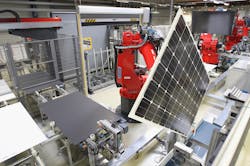Since the days of Mary Shelley, horror writers have bandied out the same sci-fi trope: Some well-meaning, industrious engineer tries to artificially create life to make humanity better. The experiment is successful, but it all goes haywire in the third act. The engineer is branded a mad scientist and probably dismembered by his creation, and we’re taught to fear scientific progress.
According to a recent National Bureau of Economic Research study,“Robots Are Us: Some Economics of Human Replacement,” we should have listened.
The paper starts off rather grim, asking if smart machines will replace humans as the internal combustion engine usurped horses, then answers, “Our model says yes.”
The study’s authors from Boston University and Columbia University’ inputted values for workers and production into the economic model. Their goal was to test the impact of workplace automation and demonstrate robots’ role in the future.
“Its central message is disturbing,” the authors write. “Absent appropriate fiscal policy that redistributes from winners to losers, smart machines can mean long-term misery for all.”
The study’s reason is strictly economic: “Under the right conditions, more supply produces, over time, less demand as the smart machines undermine their customer base.”
Robots aren’t going to terminate us in the “metamorphic-metal-finger-blade-through-the-eye” sense, but 68% of high-tech workers will nonetheless be terminated, the study says.
Take that, Isaac Asimov and James Cameron. Economists like John Maynard Keyes are the true apocalyptic visionaries.
The model also tested what would happen if governments tried to compensate wages after this pending positive test shock, which some equate to the Industrial Revolution. They cite that a high national saving rate can soften the blow. Workers may earn a little less, but could consume 20% more than before the shock.
There seems to be more bad than good, though. It predicts that labor’s share of national income will drop from three-fourths to 57%, and that overall national income to drop by 15%.
These stats, looking at a macro-scale, aren’t as scary as thinking about finding a new job, most likely earning less and still trying to raise a family. They are still stats, though, and even though economic models are based in reality and numbers, merely project a possible future.
Take a look here to see how experts’ opinions differ in the subject of “AI, Robotic, and the Future of Jobs,” from the Pew Research Center. Of the 1,896 people surveyed, 52% thought technology will not replace more jobs than it creates by 2025, while 48% are apparently prepping for life in the Matrix.
So no one knows how automation will affect jobs in 10 years any more than people knew in 1985 how the Internet would change the world. Our advice is to know as much as you can about how automation will affect you and don't let horror stories keep you up at night.
A detailed breakdown of the study can be found at journalistresource.org.
About the Author
John Hitch
Editor, Fleet Maintenance
John Hitch, based out of Cleveland, Ohio, is the editor of Fleet Maintenance, a B2B magazine that addresses the service needs for all commercial vehicle makes and models (Classes 1-8), ranging from shop management strategies to the latest tools to enhance uptime.
He previously wrote about equipment and fleet operations and management for FleetOwner, and prior to that, manufacturing and advanced technology for IndustryWeek and New Equipment Digest. He is an award-winning journalist and former sonar technician aboard a nuclear-powered submarine where he served honorably aboard the fast-attack submarine USS Oklahoma City (SSN-723).

